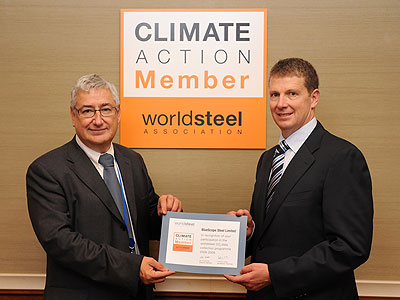GREENHOUSE GASES
AND CLIMATE CHANGE

BLUESCOPE STEEL REMAINS COMMITTED TO REDUCING THE GREENHOUSE GAS INTENSITY OF OUR OPERATIONS AND CONTINUOUSLY IMPROVING OUR ENVIRONMENTAL FOOTPRINT
Despite the recent economic downturn, BlueScope Steel remains committed to progressively reducing its emissions, and continues to play an active role in the global steel industry’s efforts to combat climate change.
The steel industry faces some unique challenges as the world moves towards a lower carbon global economy. Making iron and steel produces significant quantities of greenhouse gases. In an integrated steelworks, carbon, in the form of coal and coke, is the reducing agent used to convert iron ore to iron in a blast furnace. Carbon dioxide and other greenhouse gases are emitted as an unavoidable by-product of this process.
The laws of chemistry, physics and thermodynamics dictate the amount of carbon used in the blast furnace, with current usage close to theoretical minimum levels. Any significant reduction in direct emissions will therefore require a major technology breakthrough.
In response to these challenges BlueScope Steel, in partnership with other steel makers and the World Steel Association (worldsteel), representing approximately 80 per cent of the world’s steelmakers, is contributing to worldwide data collection and research efforts.
Specifically, BlueScope Steel is engaged in two research projects under the worldsteel CO2 Breakthrough Programme. The first project focuses on the potential to use a proportion of biomass as a substitute for more typical carbon sources, such as coal, in the iron and steelmaking process.
The second project aims to develop a dry slag granulation process. This concept has a number of potential environmental benefits, including but not limited to, the recovery and utilisation of waste heat generated during the slag granulation process.
BlueScope Steel is also recognised, under the worldsteel Climate Action recognition program, for its participation in the greenhouse gas data collection process.

Above: CEO Paul O'Malley (right) receives the World Steel Association's Climate Action certificate in recognition of BlueScope's participation in the CO2 data collection program.
Further to the worldsteel climate change related activities, BlueScope Steel continues to support the Australian Government as a member of the Asia-Pacific Partnership on Clean Development and Climate (APP) steel task force. This partnership aims to reduce the global greenhouse gas emissions from the iron and steel industry by facilitating international iron and steel making technology transfers. The partnership includes iron and steel making representatives from Japan, USA, Korea, China, India, Australia and Canada.
Despite the technical limitations in reducing direct emissions from the iron and steelmaking process, the Company continues to seek innovative and effective ways of reducing its greenhouse gas emissions. The most significant opportunity we have in the short to medium term is to reduce the emissions coming from purchased electricity. We can do this by using energy more efficiently, through projects like the proposed Steelworks Cogeneration Project (SCP) at Port Kembla Steelworks, one of the single largest abatement opportunities in Australia.
The proposed SCP is a $1 billion plus project, which would make more efficient use of iron and steelmaking by-product gases, currently flared to the atmosphere, to generate steam and electricity. The project would make the Port Kembla Steelworks self-sufficient in electricity, offsetting approximately 1 million tonnes of greenhouse gases per year, equal to removing 200,000 cars from the road annually, by reducing demand for electricity from the coal-fired grid.
BlueScope has spent $100 million on proving the feasibility of the project which is currently on hold due to the impact of the economic downturn, uncertainty regarding the impact of the CPRS on our competitiveness, and the scale of the investment required.
